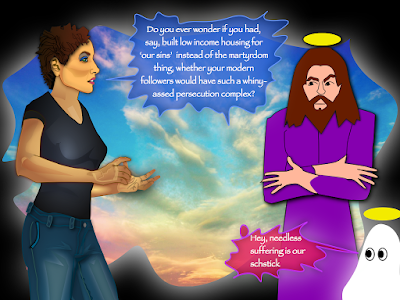Ten years ago Walter Wuellenweber asked in Stern where “Mother” Teresa’s millions were. The Science and Rationalists’ Association of India republished it.
It quotes some people who have found MT’s putative saintliness not all that generous or useful.
In Calcutta, one meets many doubters.
For example, Samity, a man of around 30 with no teeth, who lives in the slums. He is one of the “poorest of the poor” to whom Mother Teresa was supposed to have dedicated her life. With a plastic bag in hand, he stands in a kilometre long queue in Calcutta’s Park Street. The poor wait patiently, until the helpers shovel some rice and lentils into their bags. But Samity does not get his grub from Mother Teresa’s institution, but instead from the Assembly of God, an American charity, that serves 18000 meals here daily.
“Mother Teresa?”says Samity, “We have not received anything from her here. Ask in the slums — who has received anything from the sisters here — you will find hardly anybody.”
Serving meals wasn’t her thing. Her thing was “caring for the dying” – which can mean anything or nothing, and in her case it meant mostly nothing – a minimal bed and some aspirin now and then. It wasn’t medical care and it wasn’t genuine comfort – it was parsimonious shelter and lashings of piety.
Pannalal Manik also has doubts. “I don’t understand why you educated people in the West have made this woman into such a goddess!” Manik was born some 56 years ago in the Rambagan slum, which at about 300 years of age, is Calcutta’s oldest. What Manik has achieved, can well be called a “miracle”. He has built 16 apartment buildings in the midst of the slum — living space for 4000 people. Money for the building materials — equivalent to DM 10000 per apartment building — was begged for by Manik from the Ramakrishna Mission [a Indian/Hindu charity], the largest assistance-organisation in India. The slum-dwellers built the buildings themselves. It has become a model for the whole of India. But what about Mother Teresa? “I went to her place 3 times,” said Manik. “She did not even listen to what I had to say. Everyone on earth knows that the sisters have a lot of money. But no one knows what they do with it!”
What they don’t do with it, however, is share it with the poor or afflicted. That’s apparently too worldly for their taste.
Compared to other charitable organisations in Calcutta, the nuns with the 3 blue stripes are ahead in two respects: they are world famous, and, they have the most money. But how much exactly, has always been a closely guarded secret of the organisation. Indian law requires charitable organisations to publish their accounts. Mother Teresa’s organisation ignores this prescription! It is not known if the Finance Ministry in Delhi who would be responsible for charities’ accounts, have the actual figures. Upon STERN’s inquiry, the Ministry informed us that this particular query was listed as “classified information”.
That’s all wrong. Charities should be on the record. Charities should be accountable.
The organisation has 6 branches in Germany. Here too financial matters are a strict secret. “It’s nobody’s business how much money we have, I mean to say how little we have,” says Sr Pauline, head of the German operations. Maria Tingelhoff had had handled the organisation’s book-keeping on a voluntary basis until 1981. “We did see 3 million a year,” she remembers. But Mother Teresa never quite trusted the worldly helpers completely. So the sisters took over the financial management themselves in 1981. “Of course I don’t know how much money went in, in the years after that, but it must be many multiples of 3 million,” estimates Mrs Tingelhoff. “Mother was always very pleased with the Germans.”
It’s not true that it’s no one’s business how much money they have. They solicit and accept donations; that makes it everyone’s business how much money they have and what they do with it.
Perhaps the most lucrative branch of the organisation is the “Holy Ghost” House in New York’s Bronx. Susan Shields served the order there for a total of nine and a half years as Sister Virgin. “We spent a large part of each day writing thank you letters and processing cheques,” she says. “Every night around 25 sisters had to spend many hours preparing receipts for donations. It was a conveyor belt process: some sisters typed, others made lists of the amounts, stuffed letters into envelopes, or sorted the cheques. Values were between $5 and $100.000. Donors often dropped their envelopes filled with money at the door. Before Christmas the flow of donations was often totally out of control. The postman brought sackfuls of letters — cheques for $50000 were no rarity.” Sister Virgin remebers that one year there was about $50 million in a New York bank account. $50 million in one year! — in a predominantly non-Catholic country. How much then, were they collecting in Europe or the world? It is estimated that worldwide they collected at least $100 million per year — and that has been going on for many many years.
While the people they were supposedly “helping” went without medical care, privacy, clean bedding – nearly everything they needed.
England is one of the few countries where the sisters allow the authorities at least a quick glance at their accounts. Here the order took in DM5.3 million in 1991. And expenses (including charitable expenses)? — around DM360,000 or less than 7%. Whatever happened to the rest of the money? Sister Teresina, the head for England, defensively states, “Sorry we can’t tell you that.” Every year, according to the returns filed with the British authorities, a portion of the fortune is sent to accounts of the order in other countries. How much to which countries is not declared. One of the recipients is however, always Rome. The fortune of this famous charitable organistaion is controlled from Rome, — from an account at the Vatican bank. And what happens with monies at the Vatican Bank is so secret that even God is not allowed to know about it. One thing is sure however — Mother’s outlets in poor countries do not benefit from largesse of the rich countries. The official biographer of Mother Teresa, Kathryn Spink, writes, “As soon as the sisters became established in a certain country, Mother normally withdrew all financial support.” Branches in very needy countries therefore only receive start-up assistance. Most of the money remains in the Vatican Bank.
No wonder they made her a saint – she increased their fortune by perhaps billions.
The millions that are donated to the order have a similar fate. Susan Shields (formerly Sr Virgin) says, “The money was not misused, but the largest part of it wasn’t used at all. When there was a famine in Ethiopia, many cheques arrived marked ‘for the hungry in Ethiopia’. Once I asked the sister who was in charge of accounts if I should add up all those very many cheques and send the total to Ethiopia. The sister answered, ‘No, we don’t send money to Africa.’ But I continued to make receipts to the donors, ‘For Ethiopia’.”
And people in Ethiopia continued to starve, while that money – which the donors had intended for famine relief in Ethiopia – went to the Vatican Bank.
By the accounts of former sisters, the finances are a one way street. “We were always told, the fact that we receive more than other orders, shows that God loves Mother Teresa more. ,” says Susan Shields. Donations and hefty bank balances are a measure of God’s love. Taking is holier than giving.
The sufferers are the ones for whom the donations were originally intended. The nuns run a soup kitchen in New York’s Bronx. Or, to put in straight, they have it run for them, since volunteer helpers organise everything, including food. The sisters might distribute it. Once, Shields remembers, the helpers made an organisational mistake, so they could not deliver bread with their meals. The sisters asked their superior if they could buy the bread. “Out of the question — we are a poor organisation.” came the reply. “In the end, the poor did not get their bread,” says Shields.
This is, to put it plainly, fraud. “Mother” Teresa defrauded millions of people who gave what they thought was money for relief of poverty and illness but in fact was just more wealth and power and influence for the Catholic church. She wasn’t just not a saint, she was a crook. Probably not a conscious crook, but a crook all the same.
Because of the tightfistedness of the rich order, the “poorest of the poor” — orphans in India — suffer the most. The nuns run a home in Delhi, in which the orphans wait to be adopted by, in many cases, by foreigners. As usual, the costs of running the home are borne not by the order, but by the future adoptive parents. In Germany the organisation called Pro Infante has the monopoly of mediation role for these children. The head, Carla Wiedeking, a personal friend of Mother Teresa’s, wrote a letter to Donors, Supporters and Friends which ran:
“On my September visit I had to witness 2 or 3 children lying in the same cot, in totally overcrowded rooms with not a square inch of playing space. The behavioural problems arising as a result cannot be overlooked.” Mrs Wiedeking appeals to the generosity of supporters in view of her powerlessness in the face of the children’s great needs. Powerlessness?! In an organisation with a billion-fortune, which has 3 times as much money available to it as UNICEF is able to spend in all of India? The Missionaries of Charity has have the means to buy cots and build orphanages, — with playgrounds. And they have enoungh money not only for a handful orphans in Delhi but for many thousand orphans who struggle for survival in the streets of Delhi, Bombay and Calcutta.
That’s like the nuns and priests who ran the horrible industrial “schools” in Ireland that locked up the children of the poor and treated them like garbage. The state gave them money for the support of the children, and the church kept much of it for itself.
It’s a multi-level multi-country crime; it’s fraud on a massive scale. And what do we see? “Sainthood” and fawning coverage by the global news media.







